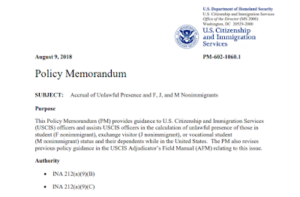United States Citizenship and Immigration Services (USCIS) August 9, 2018 policy memorandum revises the calculation of unlawful presence of those under F, J, or M nonimmigrant visa status and their dependents during their stay in the United States.
 Under the new memorandum, those holding F, J, or M visas who have failed to maintain their 2018 will have started to accrue unlawful presence on that day or on the earliest of the following:
Under the new memorandum, those holding F, J, or M visas who have failed to maintain their 2018 will have started to accrue unlawful presence on that day or on the earliest of the following:
nonimmigrant status before August 9,
- If the DHS made a formal finding that the F, J, or M visa holder violated his or her nonimmigrant status: the day after the U.S. Department of Homeland Security (DHS) denied the request for an immigration benefit;
- If the F, J, or M visa holder was admitted for a certain date: the day after the authorized period expired;
If an immigration judge ordered the F, J, or M visa holder excluded, deported, or removed: the day after the removal order is issued, regardless of whether or not the decision is appealed.
For those who failed to maintain their nonimmigrant status on or after August 9, 2018, unlawful presence begins on the earliest of the following:
- The day after the F, J, or M visa holder no longer pursues the course of study or the authorized activity;
- The day after the F, J, or M visa holder engages in an unauthorized activity;
- The day after completing the course of study program, including any authorized practical training and any authorized grace period;
- The day after the authorized period expired if the F, J, or M visa holder was admitted for a certain date;
The day after an immigration judge ordered the F, J, or M visa holder excluded, deported or removed, regardless of whether or not the decision is appealed.
To maintain nonimmigrant status, F, J, or M visa holders must be enrolled in a full-time course study or remain in the exchange program, not engage in unauthorized employment or other unauthorized activities, and complete the academic or exchange program in a timely manner or obtain an extension from the school or exchange program.
F, J, or M visa holders can accidentally or unknowingly violate their status through seemingly innocent activities. These activities include, but are not limited to dropping below a full course or working an hour over the allowed number of working hours. Those actions may then lead to a 3-year or 10-year ban since persons who accrues more than 180 days of unlawful presence in the U.S. is generally barred from returning to the U.S. for 3 years while a person who departs after accruing one year or more of unlawful presence is barred from returning for 10 years.
An application for reinstatement filed by an F and M visa holder not more than five months after they have been out of status may have their accrual of unlawful presence tolled while the application for reinstatement is pending with the USCIS. If the application is denied, the accrual of unlawful presence resumes on the day after the denial. If an F, J, or M visa holder’s application for reinstatement is ultimately approved, they will generally not accrue unlawful presence for the time that they were out of status.
This policy also affects the dependents of those who are studying or will study in the U.S. since the dependent’s authorized period of stay is contingent on the F, J, or M visa holder remaining in a period of authorized stay and ends when the F, J, or M visa authorized period of stay ends, or upon the dependent’s own conduct.




